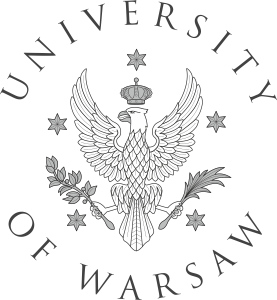16 kwietnia 2021
The academic community of the University of Warsaw is diverse. The safety and wellbeing of its members are essential. UW aims to build an environment free from any form of unequal treatment. People studying and working at UW can seek psychological and legal support offered by the university.
The University of Warsaw is a place where there is no room for any kinds of discrimination. UW strives to build friendly, peaceful, and safe surrounding, where everyone, regardless of their nationality, gender, age, disability, sexual orientation, and religion, will feel comfortable.
There are various institutions at UW whose task is to support those who experienced any form of discrimination or unequal treatment. Dr. Anna Cybulko, the University of Warsaw Ombudsman, plays a significant role. The Ombudsman is a fully independent and neutral university officer to whom students, academic and administrative staff may turn for assistance as they experience difficulties in their academic life.
The Ombudsman can serve as a mediator, help to clarify the reported case, intervene in a given unit or suggest a recommendation to introduce system changes. In some cases, the Ombudsman takes disciplinary actions and reports them to other bodies or committees. Every case is individual, treated with honesty and fairness.
The Academic Ombudsman accepts reports in person, by e-mail or telephone. The Ombudsman’s intervention in a particular case follows the Ombudsman’s meeting and the written consent of a person who reports.
The Ombudsman offers:
- Direct support for a person experiencing discrimination,
- Information on available psychological help, redirection to the Psychological Assistance Centre if necessary,
- Contact with a faculty / relevant academic unit and assistance in obtaining organisational support,
- Educational activities towards the perpetrator, e.g. direct explanatory and educational conversation, conversation with the perpetrator’s superiors, recommendation to participate in anti-discrimination training/workshops.
- Disciplining actions against the perpetrator – written signal to the supervisor, recommendation to initiate a formal complaint procedure.
email: ombudsman(at)uw.edu.pl
Since 2016, there is the Equal Opportunity Chief Specialist at the University, engaged in anti-discrimination policy, equal treatment, and diversity at our University. This person takes steps to respect and implement equal treatment and to prevent discrimination.
Anti-discrimination procedure
The anti-discrimination procedure at the University of Warsaw defines rules for counteracting manifestations of discrimination, including sexual harassment and how to tackle cases of discrimination at the University of Warsaw. View the full text of the Antidiscrimination Procedure (pdf).
The procedure aims to support actions against discrimination, protect members of the UW community, and support people who have experienced discrimination.
The Anti-Discrimination Committee and the Anti-Discrimination Coordinator, whose tasks include receiving and investigating complaints about discrimination, collecting data on its manifestations and collecting information on good practices related to anti-discrimination, are responsible for counteracting discrimination and its consequences at the University of Warsaw.
The Anti-discrimination committee and the Anti-discrimination Coordinator cooperate with the Ombudsman and the Equality Specialist at the University.
Contact to the Anti-discrimination coordinator: rownouprawnienie(at)uw.edu.pl
Contact to the Ombudsman: ombudsman(at)uw.edu.pl
Reporting the cases of sexual harassment
UW treats all reports regarding sexual harassment and sexual violence seriously. In the autumn of 2020, three such cases were reported to the disciplinary officer. We want to stress that people who have experienced sexual violence will be heard as a UW’s priority is to ensure a safe work and study environment, free from sexual harassment and violence.
Victims should make independent and individual decisions to report the case. At the same time, unit authorities cannot be encouraged to take preventive actions based on unconfirmed information or rumours.
Counteracting sexual violence
UW strives to counteract various forms of violence by conducting broadly understood educational activities. Those who work and study at UW are offered an online Course for Equality in Polish and English, workshops on shaping equality attitudes as part of university-wide classes. In October, together with the University of Warsaw Student Council, an anti-discrimination event was organised.
In April, the University of Warsaw Guide: Counteracting sexual harassment will be out. It will include some recommendations regarding the diagnosis of sexual harassment, explicit consent, possible actions to be taken by victims and witnesses, and information on emotional and intimate relationships between people from the UW community.
All those activities aim to raise awareness about discrimination and sexual harassment, encourage victims to contact relevant institutions, and report their cases.
Legal support at UW
- University of Warsaw Law Clinic – Student Legal Aid Centre
The Law Clinic is an institution that operates at the UW Faculty of Law and Administration. It provides free of charge legal advice on a wide range of legal areas (e.g. labour law, civil law, criminal law, medical law, etc.), including assistance to victims experiencing violence and discrimination. Anyone who has experienced unequal and discriminatory treatment has the right to turn to the Clinic, where students under the guidance of a lecturer provide help. More information >>
- Academic Legal Counselling
The Academic Legal Counselling is an institution providing free of charge legal aid to students, including those who have experienced unequal treatment, become victims of harassment, mobbing, or their rights have been violated in any other way. Individuals who provide counselling in the unit are students in the last years of their studies, graduates and doctoral candidates of the UW Faculty of Law and Administration. More information >>
- Centre for Disputes and Conflict Resolution at the UW Faculty of Law and Administration
The Centre promotes amicable conflict resolution, to which anyone who has experienced discrimination, violence or unequal treatment may resort. One of the objectives pursued and disseminated by the Centre is to strengthen respect for human rights, tolerance and acceptance, and to promote modern ways of resolving conflicts. More information >>
Psychological support
The UW Psychological Counselling Centre (CPP) is a unit that offers UW students and employees help and support. Individual counselling and walk-in-clinic interventions take place online. The day before a scheduled appointment, a person will receive an email from a therapist, including instructions regarding a way of contact: Skype or Google Meet. More information >>
The Rector’s Committee for Preventing Discrimination is also available at the University of Warsaw. It monitors observance of the principle of equal treatment at the University of Warsaw, develops possible solutions to problems arising from the violation of the prohibition of discrimination, and offers help to those who suffered from unequal treatment, initiates investigations and applies for disciplinary actions. Any reported problem to the Committee is confidential. More information >>
Source: www.en.uw.edu.pl
15 kwietnia 2021
The 4EU+ Governing Board, comprising Rectors of six member universities of the 4EU+ Alliance, met online to pass a resolution to establish an association “4EU+ European University Alliance e.V.”. The association’s registered office will be in Heidelberg, Germany.
“This legal entity represents a strengthened and deepened cooperation among our six research-intensive universities. It is a pledge for a higher level of mutual relations,” said Prof. Tomáš Zima, Rector of Charles University and Chair of the 4EU+ Governing Board.
As a “European University”, the 4EU+ Alliance is implementing the activities that form part of the Erasmus+ project, focused on innovative education and mobility, and the “top-up” Horizon 2020 project, TRAIN4EU+, which supports the universities’ coordinated transformation efforts at the research and innovation level. At the same time, the Alliance also offers programmes supporting the collaborative research projects and initiatives strengthening the 4EU+ community.
This intensified cooperation does not come without hurdles, for example, the lack of joint funds and property rights issues related to data sharing. Therefore, to provide a statutory framework for their cooperation, the member universities of the Alliance decided to establish a not-for-profit registered association with its seat in Heidelberg. The Association will manage the funds of the 4EU+ Alliance, maintain legal relationships with third parties (e.g., employment contracts for 4EU+ staff, contracts with service providers), serve as a platform for storing shared data and maintaining joint infrastructure, and be the owner of jointly acquired or created intangible and tangible assets.
Prof. Bernhard Eitel, Rector of Heidelberg University stated, “As a legal entity in its own right, 4EU+ is committed to advancing its strategic goals in this institutional alliance that will realize a new and mutually beneficial research, higher education and innovation agenda, enhancing our shared future within a truly European society.”
Prof. Henrik Wegener, Rector of the University of Copenhagen, also pointed to the important advancement in 4EU+ cooperation: “The establishment of a 4EU+ legal entity is an exciting next step in strengthening the ties to our closest European partners. We look forward to this new phase of collaboration with a clear commitment to fostering continued excellence within European research and education.”
The establishment of legal entity will be followed by the launch of the 4EU+ General Secretariat in Heidelberg, which will take over the responsibilities of the 4EU+ central office in Paris, and first job openings for the Secretariat’s permanent staff. To ensure a close link with 4EU+ local offices, several experts from the six member universities will also work for the Secretariat on a remote basis.
Isabelle Kratz, 4EU+ Secretary General, explains, “Within the Alliance, collaborative work is organised at several levels: between the 4EU+ local offices, within permanent working groups and within projects’ Work Package teams, within the four flagship committees, and within the Alliance’s governing bodies. Collaboration is at the heart of the Alliance’s dynamics, driven by the complementary skills and enthusiastic investment of teams at 4EU+ member universities. The Secretary General’s mission, among others, is to be the link between all these bodies and ensure coherence with the strategic axes defined by the Alliance. The added value of the association can be summarized by: simplification, pooling, visibility, accessibility, efficiency. This is where one of the missions of the General Secretariat comes into play, as it will oversee the day-to-day management of the association. It will offer transversal support to all the members of the Alliance and facilitate exchanges. In addition, the General Secretariat will carry the voice and promote the vision, ambitions and the specific identity of the 4EU+ Alliance, of which we are proud.”
In his keynote address given at the recent meeting of Directors-General for Higher Education, Prof. Jean Chambaz, Rector of Sorbonne University, also referred to 4EU+ becoming an association: “We have seen remarkable enthusiasm and engagement within our communities. They are ready for an ambitious alliance and for deeper international cooperation. 4EU+ is being built, not by rectors and presidents, but by teachers, researchers, students and staff. As you can see, this experiment is already working. But we have much more to do on this journey.”
For more information
Please visit the 4EU+ website: www.4eualliance.eu or contact our 4EU+ Communications Team:
Charles University – Mr Václav Hájek, vaclav.hajek@ruk.cuni.cz
Heidelberg University – Ms Marietta Fuhrmann-Koch, fuhrmann-koch@uni-heidelberg.de
Sorbonne University – Ms Katherine Tyrka, katherine.tyrka@sorbonne-universite.fr
University of Copenhagen – Ms Lene Düwel Andersen, lend@adm.ku.dk
University of Milan – Ms Elena Del Giorgio, elena.delgiorgio@unimi.it
University of Warsaw – Ms Katarzyna Jäger, media@uw.edu.pl
Source: www.en.uw.edu.pl
14 kwietnia 2021
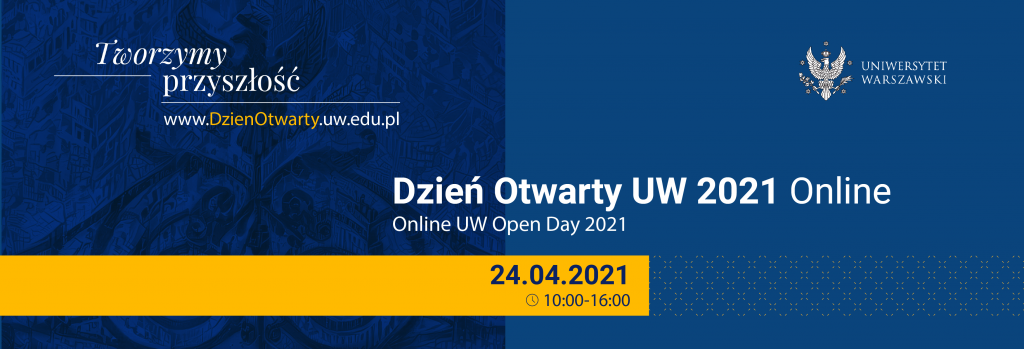
The Open Day at the University of Warsaw will take place online on 24th April. During the meeting, candidates can learn about the university’s educational offer and admission rules. To attend our virtual event, one needs to register in advance.
The Open Day is one of the most important cyclical events at the University of Warsaw. This year’s UW Open Day will be delivered entirely online. Everyone interested in studying at the University of Warsaw will have the opportunity to find out how UW operates and get to know its study programmes. The event will be opened by Prof. Sławomir Żółtek, the University of Warsaw Vice-Rector for Students and Quality of Teaching.
The University of Warsaw Open Day will be held on 24th April from 10:00 a.m to 4:00 p.m CEST on the website dzienotwarty.uw.edu.pl/info. To participate in the event, candidates are requested to register in advance by completing the form >> Following the registration, one can fully access the platform.
Studying and more
Candidates for studies at the University of Warsaw can virtually visit stands prepared by employees of faculties and departments, student organisations, and administration. Registered people will have access to materials, the possibility to chat with representatives, students and take part in online meetings using Zoom or Google Meet platforms. UW administrative officers from the Admissions Office, Welcome Point and the Promotion Office, representatives of the UW Student Council Board, will provide information on the University of Warsaw and present the admission procedure. Also, some departments have prepared additional attractions. Candidates will be introduced to the offer of the University of Warsaw Choir, Volunteer Centre of the University of Warsaw, and the 4EU + Alliance of which the University is a member.
Offer for international candidates
Candidates from abroad will also have an opportunity to learn the most important information about the University of Warsaw, admission rules and the offer of English-language studies and more. Welcome Point UW — the university information point for international students, doctoral candidates and employees — has gathered all the necessary information that one may need during their stay in Poland and at UW.
View our Facebook event >>
Admissions Office
rekrutacja.uw.edu.pl/en
admission(at)uw.edu.pl
Terms of studying in Poland
Admissions step by step
Welcome Point
central information service for international students
welcome.uw.edu.pl
welcome(at)uw.edu.pl
Online Recruitment
www.irk.oferta.uw.edu.pl/en-gb
Source: www.en.uw.edu.pl
The Ulam NAWA Programme
The Polish National Agency for Academic Exchange (NAWA) is pleased to announce the third edition of the programme for post-doctoral incoming researchers: The Ulam NAWA Programme. The programme will allow both recognised and promising scientists who hold at least a doctoral degree, to visit Poland in order to strengthen the scientific potential of Polish entities and to participate in their scientific activities, primarily research projects and didactics. The programme will allow to invite scientists regardless of their age, from all around the world and representing all fields of science, including Polish scientists working permanently abroad. HEIs, scientific and research institutes will have the opportunity to invite specialists from their priority areas to Poland – they will make a significant contribution to the research conducted by a given institution, strengthen didactics or support the institution in applying for prestigious grants.
Activities to be carried out during the Scholarship may include:
- conducting research and/or development work
- post-doctoral training
- obtaining materials for scientific work or publication
- in addition to the above activities, the visit may also include conducting didactic classes at the Host institution.
The visits under the Project can last from 6 to 24 months. The Programme provides financing for a Scholarship that covers the Fellow’s living allowance of PLN 10,000 a month, along with a mobility allowance. The visits of foreign scientists have to commence between 1 January 2022 and 1 October 2022.
Call for proposals: until 15 June 2021
Learn more about the conditions for application, timing, etc. https://nawa.gov.pl/en/scientists/the-ulam-programme
Contact person: Magdalena Kowalczyk, PhD, e-mail: magdalena.kowalczyk@nawa.gov.pl; + 48 22 390-35-72
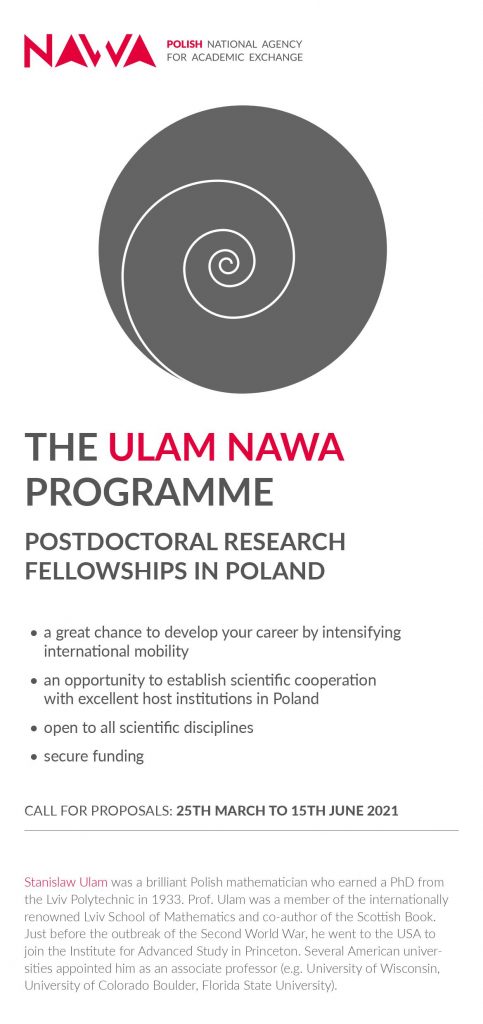
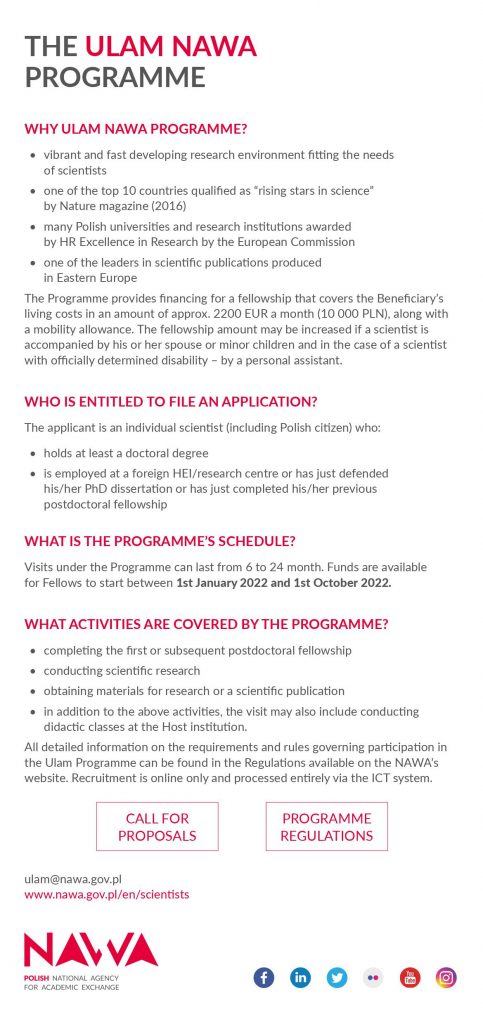
13 kwietnia 2021
Position of a PhD student in the project „Theoretical design and prediction of phosphorescent emissive materials based on halogen bonding interactions and experimental verification of their properties” financed by National Science Centre (NCN) is open for applications. The successful candidate will be supervised by Dr. Mihails Arhangelskis, becoming a member of a newly established team for computational materials design within the Crystallochemistry laboratory (group leader Prof. Dr. hab. Krzysztof Woźniak). Project leader: Dr. Mihails Arhangelskis. Deadline for applications: 10 May 2021. For more info see >> pdf
12 kwietnia 2021
The Centre of New Technologies invites to a webinar by
Paweł K. Mazur, PhD,
The University of Texas MD Anderson Cancer Center, USA
Title: Identification of oncogenic mechanisms driving lung squamous cell carcinoma development and progression.
Date: 15th April 2021 (Thursday)
Time: 15:00 pm (Central European Time)
Host: Paweł Niewiadomski, PhD,
Virtual seminar: https://us02web.zoom.us/j/86732978308
Meeting ID: 867 3297 8308
To subscribe to receive announcements about CeNT UW seminars or to unsubscribe please click here
CeNT-UW-Webinars-instruction-for-attendees
Abstract:
Amplification of chromosomal region 8p11-12 is a common genetic alteration that has been implicated in the etiology of lung squamous cell carcinoma (LUSC). The FGFR1 gene is the main candidate driver of tumorigenesis within this region. However, clinical trials evaluating FGFR1 inhibition as a targeted therapy have been unsuccessful. We identify the histone H3 lysine 36 (H3K36) methyltransferase NSD3, the gene for which is located in the 8p11-12 amplicon, as a key regulator of LUSC tumorigenesis. In contrast to other 8p11-12 candidate LUSC drivers, increased expression of NSD3 correlated strongly with its gene amplification. Ablation of NSD3, but not of FGFR1, attenuated tumour growth and extended survival in a mouse model of LUSC. We identify an LUSC-associated variant NSD3(T1232A) that shows increased catalytic activity for dimethylation of H3K36 (H3K36me2) in vitro and in vivo. Structural dynamic analyses revealed that the T1232A substitution elicited localized mobility changes throughout the catalytic domain of NSD3 to relieve auto-inhibition and to increase accessibility of the H3 substrate. Expression of NSD3(T1232A) in vivo accelerated tumorigenesis and decreased overall survival in mouse models of LUSC. Pathological generation of H3K36me2 by NSD3(T1232A) reprograms the chromatin landscape to promote oncogenic gene expression signatures. Furthermore, NSD3, in a manner dependent on its catalytic activity, promoted transformation in normal human lung epithelial cells and growth of xenografted human LUSC cell lines with amplification of 8p11-12. Depletion of NSD3 in patient-derived xenografts from primary LUSCs containing NSD3 amplification or the NSD3(T1232A)-encoding variant attenuated neoplastic growth in mice. This work defines NSD3 as a critical oncogene and reveals an actionable therapeutic vulnerability.
08 kwietnia 2021
Department of Communication and Promotion are looking for the foreign students/graduates of Polish universities who would like to promote Poland by showing their own amazing experience with Polish people, culture and language.
Your tasks will be:
- support of the Ready, Study, GO! Poland campaign;
- promotion of studies in Poland among foreigners, with special focus on country of origin;
- regular preparation of content for our and your social media pages, showing why it is fun to live & study in Poland;
- support in preparation of source data for publications (e. g. interviews with fellow students)
- taking part in promo movies on studies in Poland.
Benefits:
- initial training on copy-writing, social media and blogs;
- experience in dynamic governmental agency;
- opportunity to take part in educational fairs and/or events, either in Poland or abroad;
- opportunity for paid internship in NAWA.
We expect you to publish in English (on our web page and fan pages) and any other language that you feel comfortable with (on your social media) including Polish.
One can find more details here.
https://mail.google.com/mail/u/0/#search/dudzi/FFNDWMQXQkDKvJLCDrrDpQDzzLMwwNGf
We look forward to receiving your application until April 12, 2021 (5 pm CET). Please register here.
07 kwietnia 2021
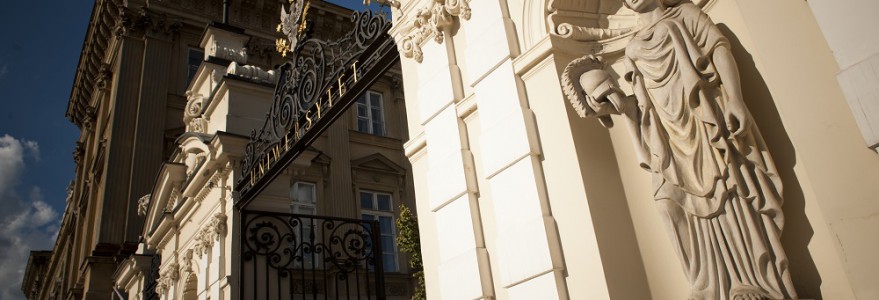
We publish the information on Employee Capital Plans (ECP; in Polish: Pracownicze Plany Kapitałowe, PPK), a voluntary long-term saving programme, developed and co-financed by employees (employees and contractors subject to obligatory social insurance), employers and the state. Payments financed by the employees, the employer, a welcome payment and an annual surcharge from the state will be transferred to individual private ECP accounts.
On 26th March, the University of Warsaw signed an agreement with the PZU SA Investment Fund Management Company (Towarzystwo Funduszy Inwestycyjnych PZU SA) on the management of PPK.
The fund will be managing assets of UW employees who decided to join PPK (aged 55-70) and those who had not resigned from participation in PPK (aged 18-54). The contract with PZU will be concluded no later than 10th April. The first contributions to Employee Capital Plans will be calculated on the remuneration paid after 10th April 2021.
To learn more about Employee Capital Plans, watch this webinar >>
After signing the contract, each PPK participant will receive a welcome letter (with access to the inPZU website). The letter will be sent to the correspondence address included in SAP (check your address of correspondence in ESS, if there are changes, please report them to the UW Human Resources Office).
A PPK participant may, in certain circumstances, reduce the basic payment or resign from a previously declared lower basic payment. The obligatory basic contribution financed by a PPK participant may be less than 2% of their remuneration, but not less than 0.5% if the remuneration of a PPK participant obtained from various sources in a given month does not exceed the amount corresponding to 120% of the minimum remuneration.
View the “Declaration on financing the basic payments into employee capital plans (PPK)”, available on the UW Human Resources website (PPK subpage) >>
Each PPK participant can declare a voluntary additional payment – up to 2% of gross remuneration.
PPK participants can, at any time:
- Declare a voluntary additional payment;
- Change the amount of the additional payment;
- Resign from making the additional payment.
“Declaration on financing the additional payments into employee capital plans (PPK)” is available on the UW Human Resources website (PPK subpage) >>
Source: www.en.uw.edu.pl
01 kwietnia 2021
The Centre of New Technologies invites to a webinar by
prof. Joanna Kargul,
Centre of New Technologies, University of Warsaw
Title: Solar-driven fuel production: Fundamental science meets industry in a quest for a shift towards a circular economy.
Date: 9th April 2021 (Friday)
Time: 12:00 pm (Central European Time)
Host: prof. Joanna Trylska
Virtual seminar: https://us02web.zoom.us/j/83847043860
Meeting ID: 838 4704 3860
To subscribe to receive announcements about CeNT UW seminars or to unsubscribe please click here
CeNT-UW-Webinars-instruction-for-attendees
Abstract:
The race for the viable artificial leaf systems that can be incorporated into the sustainable product value chains is fiercer than ever and the stakes are high – decarbonization of industry, establishing the C-circular economy and amelioration of the man-made climate change. The fundamental process of photosynthesis has been optimized by nature for over 3.5 billion years of evolution. It is directly responsible for all the air we breathe, all the food we eat and all the fuel we burn. Artificial photosynthetic devices mimic this process by using the simplest and widely abundant molecules, i.e., water, CO2, and nitrogen and converting them into carbon-neutral solar fuels and other products, such as fertilizers and high value chemicals. Recent progress in the understanding of fundamental mechanisms of photosynthesis makes it now possible to contemplate developing, in a reasonable timeframe, the artificial photosynthesis technologies driving the production of sustainable fuels and commodity chemicals using the power of the Sun as the only energy source.
For efficient „green” solar energy conversion, it is essential to develop new paradigms for the rational design of highly efficient and viable (≥TRL8) artificial photosynthetic devices by utilising state-of-the-art synthetic and biological photo-converting materials, as well as devising highly organised nanoarchitectures in order to make large gains in solar energy conversion compared to the present-day technologies. Only by combining fundamental mechanistic studies of charge transfer with optimisation of the conductive molecular interface between the robust working modules operating at high quantum efficiencies can we tap into the Holy Grail of viable solar-to-fuel technologies. I will overview recent advances in the field, also including our own work at CeNT UW which focuses on the biosolar technologies, whereby robust natural photoenzymes and advanced synthetic materials are rationally interfaced to yield the devices that show significantly improved light harvesting functionalities and solar conversion efficiencies.
Student position is available in Grela’s group from the TEAM-TECH programme of the Foundation for Polish Science (two offers) „Catalysis for the Twenty-First Century Chemical Industry”. Project leader: prof. dr hab. eng. Karol Grela. Deadline for applications: 30 April 2021. For more info see >> pdf

